The United States has imposed a new round of sanctions targeting more than 300 entities, including over a dozen Chinese companies, for their alleged support of Russia's military and defense industry amid the ongoing war in Ukraine. The sanctions, announced by the Treasury and State Departments on Wednesday, aim to disrupt Russia's war efforts by targeting its military-industrial base and the evasion networks that help supply it.
Among the nearly 300 targets sanctioned are Chinese "entities responsible for developing and supplying dual-use aerospace, manufacturing, and technology equipment to entities based in Russia," according to a State Department fact sheet. These companies are accused of shipping goods to U.S.-designated entities in Russia, contributing to the strengthening of Moscow's defense capabilities.
Treasury Secretary Janet Yellen emphasized the importance of the sanctions, stating that they "will further disrupt and degrade Russia's war efforts by going after its military-industrial base and the evasion networks that help supply it." The move comes after repeated warnings from top U.S. officials, including Yellen and Secretary of State Antony Blinken, to Chinese officials about the need to crack down on China's provision of dual-use items to Russia.
In addition to the Chinese firms, the sanctions also target entities within Russia, Azerbaijan, Belgium, Slovakia, Turkey, and the United Arab Emirates. These penalties aim to block the sanctioned companies from using the U.S. financial system and bar American citizens from dealing with them.
The Biden administration has grown increasingly concerned about China's support for Russia's defense industrial base, which the U.S. believes has allowed Moscow to continue its war against Ukraine. As Russia rebuilds its defense capabilities, the U.S. has sought to rally allies to pressure Beijing to stop providing this support, either through diplomatic means or, if necessary, punitive measures.
"Russia is no longer kind of on its back foot," a senior State Department official said before Blinken's trip to China. "They are surging. They have substantial assets, they reconstituted. They pose a threat not just to Ukraine but to the wider region."
Despite the U.S. warnings, there is little indication that Beijing intends to change course. Blinken, who recently met with Chinese officials in Beijing, said he was "extremely clear about our concerns in some detail" regarding China's support for Russia's defense industrial base but added that "we'll have to see what actions follow from that."
Alongside the sanctions targeting Chinese firms, the U.S. Senate gave final approval to legislation barring imports of Russian uranium, further intensifying efforts to disrupt Russia's war in Ukraine. The bill, which President Biden is expected to sign into law, aims to reduce U.S. reliance on Russian uranium, which currently accounts for about 12% of the uranium used to produce electricity at U.S. nuclear power plants.
The uranium import ban is expected to impact Russian revenues by at least $1 billion and has been praised by lawmakers from both parties. Sen. John Barrasso, a Republican from Wyoming, called the ban "a tremendous victory" that will "help defund Russia's war machine, revive American uranium production and jumpstart investments in America's nuclear fuel supply chain."






